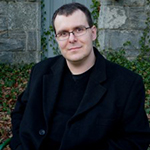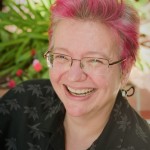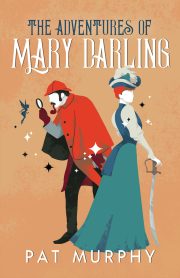An Interview with Django Wexler
by Cat Rambo
 Django Wexler graduated from Carnegie Mellon University in Pittsburgh with degrees in creative writing and computer science, and worked for the university in artificial intelligence research. Eventually he migrated to Microsoft in Seattle, where he now lives with two cats and a teetering mountain of books. When not planning Shadow Campaigns, he wrangles computers, paints tiny soldiers, and plays games of all sorts.
Django Wexler graduated from Carnegie Mellon University in Pittsburgh with degrees in creative writing and computer science, and worked for the university in artificial intelligence research. Eventually he migrated to Microsoft in Seattle, where he now lives with two cats and a teetering mountain of books. When not planning Shadow Campaigns, he wrangles computers, paints tiny soldiers, and plays games of all sorts.
•••
The Thousand Names has been called “flintlock fantasy,” which is a departure from the normal technology level of epic fantasy. What made you decide to move in that direction?
To begin with, I got a lot of inspiration from George R. R. Martin’s A Song of Ice and Fire. I really loved what he did with that world — taking the staple fantasy setting, with castles and knights and so on, and bringing it back to be closer to its historical roots, putting a bit of realism in it. I really wanted to do something like that, but at the same time I felt like he had more or less nailed it for that particular historical period, so I had to look elsewhere.
I have always thought that it’s a little strange that fantasy tends to concentrate on what’s really a very small slice of history (basically 13th or 14th century England) when there’s so much available to use as an archetype. So I was really excited about the idea of basing a fantasy world on something else, and when I started reading about Napoleon I thought, “Okay, this is it!”
Since you’re working in a world inspired by Napoleonic history, will we see a Napoleonic figure somewhere along the line? Or do you see one of the characters already fitting in that role?
I was originally going to make the whole story a kind of fictionalized life of Napoleon, in sort of the same way S.M. Stirling and David Drake did with Belisarius in The General. Once I got started though, it didn’t work out that way, and a lot of the secondary characters became much more important. There are still bits and pieces of the old framework around, though — the reason the book takes place in a hot, desert country is because it was originally modeled on the French invasion of Egypt in 1798.
Janus bet Vhalnich, the commander of the Vordanai army (that is, the protagonists) was originally supposed to be the Napoleon character, and in a lot of ways he still fills that role. A big theme in the rest of the series, once he demonstrates his abilities, is his relationship to his country and its civilian leadership. One of the things that fascinated me about Napoleon’s story is his relationship with the Revolutionary government — they knew he was smart, ruthless, and ambitious, but he was so good (and so many other generals so bad) that they couldn’t do without him. It’s something I’m working hard to try and capture.
The battle details are compellingly realistic, down to the smell of gunpowder, the utter chaos of battle, and the thunder of the cannons. How did you go about researching flintlock technology?
I didn’t do much research on the technology per se, but rather on the experience of battle in the era and what it was like for the people involved. Fortunately, compared to the Middle Ages, there was a lot more literacy in the Napoleonic era, so there are reams of primary sources that helpful historians have dug through and written fine books about. I thought the important thing was to try as best I could to capture the flavor of it, what it felt like, from those accounts. So not so much the specific mechanics of a musket loading drill as the way the kick feels like it will break your shoulder, or how you end up with your mouth dry and coated with powder from tearing open paper cartridges with your teeth.
How did you go about setting up the rules of how magic works in the world of A Thousand Names? How did you try to distinguish it from the countless other magic systems in existence?
Basically, I worked backward from the nature of the world that I wanted to end up with. I knew I wanted the military stuff to matter, so that battles weren’t just a sideshow to the god-wizards squaring off, so magic had to be subtle and fairly rare. It’s so rare in fact that most people don’t believe in it, so our main characters are startled when they get pulled into supernatural goings-on.
At the same time, I knew I didn’t want to use the stock fantasy trope, Old Father Exposition, the old man who turns up around Chapter Three and lays out the ground rules for the heroes. In the world of The Thousand Names magic is weird and poorly understood, and different cultures and traditions have different understandings of it and different beliefs about how it actually works. There’s a lot of stuff people just don’t know. The difficult trick is to achieve that nice uncertainty without the reader feeling like you’re making it all up as you go along.
The release of the book was accompanied by the release of a free fantasy story, “The Penitent Damned,” which is a prequel to the books. How did you come to write the story? Was it marketing-driven or something that you wrote for other reasons?
Seth Fishman, my agent, and I were brainstorming things I could do for publicity in addition to what Penguin was setting up, and on the list was “write something set in the universe and put it on the web.” Originally I was thinking more in terms of a background or historical piece, but when I started playing around with it I got a decent idea for a short story, so I went with that. It was a surprise to me, because I’m not normally much of a short story writer. I think it’s worked out really well as publicity — it’s great to have a complete piece I can point people to and say, “Hey, check this out, and if you like it maybe you’ll like the book!” Right now I’m working out how I can get it up on the Kindle store.
At what point did you realize that your fantasy series was going to be a quintet rather than the more traditional trilogy?
I originally planned a trilogy, because — well, it’s fantasy, and that’s what fantasy does, trilogies. When I submitted it to Seth, I had a vague idea of where the overall plot was going to go, but I hadn’t fleshed out the specifics. After we revised the book itself, he asked me for synopses of the rest of the series. That was a hard bit of writing, and it quickly became clear that three books were not going to be enough to cover the ground I wanted to cover. Eventually I wrote out a rough plan and figured out which points were book-sized climaxes that would make for a satisfying story, and ended up with five volumes.
The Thousand Names is your first published book. What surprised you the most about the publication process?
It’s taken me a while to get used to how slow everything is. I used to work in the tech industry, where things happen quickly, often ridiculously quickly. The idea of casually saying, “Okay, well, we’ll get to that sometime in 2015” seemed absurd to me. But in an industry that is (for the moment) basically about moving tons of physical stuff around the world, it makes sense. I admit to a little frustration though when I signed with Penguin in winter of 2012 and they told me I had eighteen months to wait!
You’re also working on a MG fantasy series. Is it difficult to move from writing for one age level to another? What do you find yourself having to keep in mind?
I didn’t actually mean to write a children’s book, I just wanted to write something shorter than my usual gigantic tome. It really just sort of worked out that way. When I figured out I was writing MG, I didn’t really know how to go about it, so I wrote the way I always do. The only really conscious change I made was to leave out swearing, sex, and gore, which wasn’t all that hard.
Later, my editor Kathy Dawson went through the book and gave me some notes on vocabulary in a few places. But overall it’s been surprisingly easy to adjust. I’m a firm believer in giving kids a lot of credit, rather than trying to write “down” to them.
You recently visited San Diego ComicCon as part of the promotional effort for the book. What did you do at the con to promote the book, and what did you think of the con overall?
This was my first time at SDCC, and it’s just total insanity. Being there is utterly exhausting, just from the amount of stuff your brain has to sort through while you move through the crowds. The promotional and professional parts of the con were a ton of fun. I was on an Epic Fantasy panel with a bunch of wonderful authors, all of whom were very nice to me in spite of my being very much the newbie in the room, and I did a signing at the Mysterious Galaxies booth, where everyone was really friendly and very excited about the book. Penguin was giving away free samplers which had a couple of chapters of The Thousand Namesalongside a bunch of other stuff, and that seemed to work out great. I also got to go to some great parties and chat, which I always enjoy!
As for the con itself, there’s some mind-blowing stuff there, but the endless lines are a real downer for me. It makes it frustrating, because you can’t just look at the program guide and see what’s going on now; to go to something now you needed to line up for it four hours ago, so doing anything becomes a chore. The movie and TV industries also tend to dominate the events with their giant budgets, with the game industry close behind. My favorites will always be the smaller cons, where things are a bit quieter and you can check something out on a whim.
Really, though, what I love doing is meeting people. I got to see the people behind a couple of Twitter handles that I’ve gotten to be friends with, and that’s always a joy. I’m really looking forward to WorldCon in San Antonio next month.
If you were writing fanfiction, whose universe would you want to be writing in?
I used to write fan-fiction, actually, but it was odd — I found it hard to write it in a universe that I actually really liked. I wouldn’t be able to write the characters of George R. R. Martin, Joe Abercrombie, etc, nearly as well as the real author could, and it honestly never occurred to me to try. The fan-fiction I did end up writing was mostly for TV shows or anime that had good premises but crappy writing, where I felt like I could do a better job than the original!

•••
Cat Rambo’s most recent short story collection, Near + Far, appeared last fall from Hydra House. Find links to her fiction as well as her upcoming online classes on her website, http://www.


